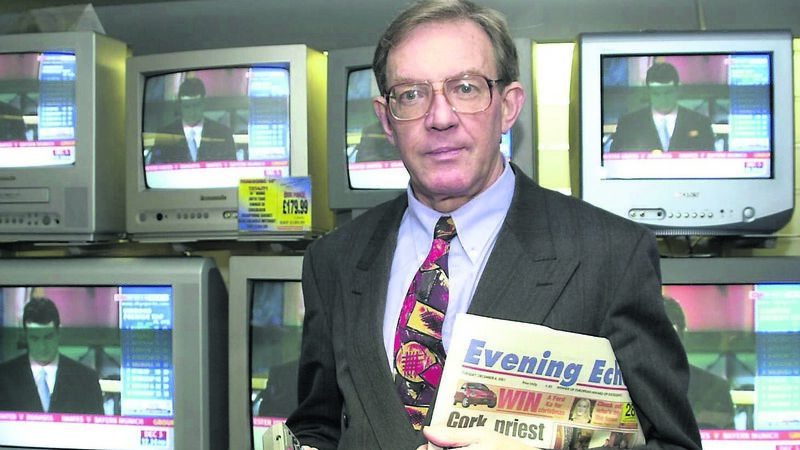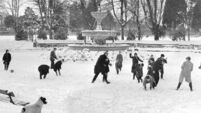The Echo was part of our staple diet in Cork much the same way as bread, milk or tripe and drisheen

NEWSPAPER MAN: TP O’Mahony with a copy of the Echo under his arm
MY grandmother, Ellen Williams, said it best: “Tommy, come in here!” she shouted, as I was enjoying a kick-around with other boys in Delaney Park. “Go down Blackpool for a loaf of bread, and don’t forget to bring back the Echo.”
That summed it up - two indispensables: Bread and the Evening Echo. And nearly every house in our park was the same: The Echo was part of our staple diet in much the same way as bread, milk or tripe and drisheen. If it wasn’t in the house it was very much missed.
It is and always has been a ‘people’s paper’ above all. Over the decades it became the irreplaceable and trusted prism through which the people of Cork viewed their world and the events shaping it.
A newspaper remains vibrant when there is a bond of trust between it and its readers. Maintaining that, come what may, in good times and in bad, is a vital responsibility. Without it, the reader loses confidence.
For 130 years the Echo has managed to preserve that precious bond.
Some papers are respected as a matter of course: Their pedigree, their track record, their status in the eyes of the populace ensure this. Others earn respect though effort, consistency, and innovation.
A few newspapers are loved. The Echo belongs in this latter category. As to the ‘why?’ of this, it is not something that invites or permits an easy answer. Familiarity is part of it.
The Echo has become an everyday ingredient - like a particular brand of tea - which has blended seamlessly into the life of the city and its environs.
It’s like the bus that we expect to find waiting for us at the bottom of the hill every day. We take it for granted most of the time, but when it isn’t there, for whatever reason, we find a big hole in our day. It was ever thus with the Echo.
And like a bus, a newspaper is a vital part of the nexus of communication that binds a community together, connecting its diverse parts.
This has always been The Echo’s strength. It is our ‘public square’. It enables us to talk to each other, to communicate and exchange ideas, views, concepts and opinions. And it also encourages us to laugh at our foibles, absurdities and obsessions, our collective silliness.
The Echo is quintessentially a people’s forum, always of the people and for the people.
In times of adversity we turn to it for comfort, solace and guidance; on joyous occasions it celebrates and rejoices with us in tasks accomplished, feats attained and trophies won.
And trophies there were a-plenty.
In the coverage of sport, The Echo always excelled, and across all codes. From hurling to road bowling, soccer to darts, rugby to track and field, the newspaper was what the fans wanted to see.
A sign of the esteem in which it is held involved no less a person than Jack Lynch. As Taoiseach he was returning to Cork in March, 1979, when he ordered the driver to stop the State car at the Coliseum corner so he could purchase an Echo.
That was the day on which the Echo boy had sad news to impart. As the Taoiseach rolled down the car window, he was shocked to learn that Christy Ring had just died.
The city’s literati and glitterati were always happy to feature in the Echo. And while the great and the good were always there, the Echo never forgot the colourful array of characters - from Klondyke and The Rancher to Kathy Barry and Bernie Murphy - who enriched the cultural tapestry of Cork.
The world of 1892 into which the Echo was born was a very different place to what it is now. Across the pond, Queen Victoria was just five years away from her diamond jubilee. In Rome, Pope Leo XIII sat on the throne of Peter, and in faraway Washington DC the President was Benjamin Harrison.
Here in Ireland, half the nation was still gossiping about the Charles Stewart Parnell-Kitty O’Shea scandal and the fall of Ireland’s uncrowned king. Soon it would be William Gladstone’s second Home Rule Bill.
But times change, and so do mores and morals. They are never frozen in aspic, and a good newspaper must reflect those changes, while sometimes casting a cold eye on them. The Echo has done this magnificently.
‘De paper’ is as emblematic of the spirit and social fabric of Cork as the Bells of Shandon, the Opera House, the Coal Quay and crubeens.
Put simply, it’s part of what we are.
TP O’Mahony’s latest book, The Politics Of God: The Rise And Rise of Political Religion, will be published by Veritas in the autumn.










 App?
App?




